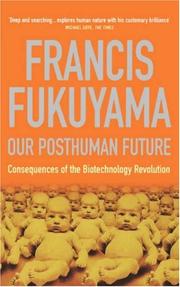| Listing 1 - 3 of 3 |
Sort by
|

ISBN: 9781861974952 1861974957 Year: 2003 Publisher: London: Profile books,
Abstract | Keywords | Export | Availability | Bookmark
 Loading...
Loading...Choose an application
- Reference Manager
- EndNote
- RefWorks (Direct export to RefWorks)
Francis Fukuyama --- Biotechnology - Social aspects --- Social change - History - 20th century --- Social history - 1945 --- -Social norms - History - 20th century --- Social integration --- Biotechnology --- Social change --- Social history --- Social norms
Book
ISBN: 9782200350956 Year: 2007 Publisher: Paris : Armand Colin,
Abstract | Keywords | Export | Availability | Bookmark
 Loading...
Loading...Choose an application
- Reference Manager
- EndNote
- RefWorks (Direct export to RefWorks)
Disinformation. --- Information warfare --- Désinformation --- Guerre de l'information --- France --- esprit critique --- complotisme --- théorie du complot --- théories du complot --- conspirationnisme --- conjurationnisme --- désinformation --- Francis Fukuyama --- Samuel Huntington (1927-2008) --- États-Unis (US) --- antisémitisme --- antiaméricanisme --- Vladimir Volkoff (1932-2005) --- Protocoles des Sages de Sion --- Charles Enderlin --- fake news --- fausses nouvelles --- conflit israélo-palestinien --- Thierry Meyssan --- Caroline Fourest --- islamophobie --- Robert Redeker --- Alexandre Del Valle
Book
ISBN: 9780691203812 9780691240879 0691240876 Year: 2022 Publisher: Princeton, N.J. : Princeton Univ. P.,
Abstract | Keywords | Export | Availability | Bookmark
 Loading...
Loading...Choose an application
- Reference Manager
- EndNote
- RefWorks (Direct export to RefWorks)
The unlikely story of how Americans canonized Adam Smith as the patron saint of free marketsOriginally published in 1776, Adam Smith's The Wealth of Nations was lauded by America's founders as a landmark work of Enlightenment thinking about national wealth, statecraft, and moral virtue. Today, Smith is one of the most influential icons of economic thought in America. Glory Liu traces how generations of Americans have read, reinterpreted, and weaponized Smith's ideas, revealing how his popular image as a champion of American-style capitalism and free markets is a historical invention. Drawing on a trove of illuminating archival materials, Liu tells the story of how an unassuming Scottish philosopher captured the American imagination and played a leading role in shaping American economic and political ideas. She shows how Smith became known as the father of political economy in the nineteenth century and was firmly associated with free trade, and how, in the aftermath of the Great Depression, the Chicago School of Economics transformed him into the preeminent theorist of self-interest and the miracle of free markets. Liu explores how a new generation of political theorists and public intellectuals has sought to recover Smith's original intentions and restore his reputation as a moral philosopher. Charting the enduring fascination that this humble philosopher from Scotland has held for American readers over more than two centuries, Adam Smith's America shows how Smith continues to be a vehicle for articulating perennial moral and political anxieties about modern capitalism.
Philosophy. --- Economics --- Mental philosophy --- Humanities --- History. --- Smith, Adam, --- United States --- Economic policy --- Economic theory --- Political economy --- Social sciences --- Economic man --- Smith, Adam --- Economic policy. --- Economic conditions. --- A Monetary History of the United States. --- Ambivalence. --- American Capitalism. --- American Enlightenment. --- American System (economic plan). --- American Thinker. --- Anna Schwartz. --- Bruno Hildebrand. --- Buoy. --- Buton. --- Capitalism. --- Chicago school of economics. --- Christian Kabbalah. --- Constantine IV. --- Corippus. --- E. P. Thompson. --- Early modern period. --- Ecclesiastical Latin. --- Economics. --- Economist. --- Economy. --- Essay. --- Ethics. --- Family resemblance. --- Forgotten man. --- Francis Fukuyama. --- Frank Hahn. --- Fraud. --- Free trade. --- Friedrich List. --- Fritz Saxl. --- Gilded Age. --- Greek fire. --- Historical figure. --- Hypothesis. --- Ideology. --- International trade. --- Interpersonal relationship. --- Invisible hand. --- Isaac Casaubon. --- Jacob Viner. --- James Tassie. --- Jewish history. --- Jewish studies. --- John Bates Clark. --- John Maynard Keynes. --- Kanji. --- Labor theory of value. --- Laissez-faire. --- Lateran. --- Learning. --- Lecture. --- Liberty Fund. --- Lifestyle (sociology). --- Lighting. --- Lionel Robbins. --- Marquis de Condorcet. --- Mercantilism. --- Michael Burawoy. --- Michael Freeden. --- Michael Polanyi. --- Milton Friedman. --- Moral economy. --- Muslim world. --- Neoliberalism. --- Occupy movement. --- Opportunity cost. --- Persuasion. --- Physiocracy. --- Policy advocacy. --- Political economy. --- Politics. --- Progress and Poverty. --- Propaganda. --- Protectionism. --- Raymond Geuss. --- Re-Define. --- Retirement. --- Richard T. Ely. --- Robert Nozick. --- Roman Law. --- Ronald L. Meek. --- Scottish Enlightenment. --- Self-interest. --- Sexual desire. --- Social phenomenon. --- Suggestion. --- Tariff of 1824. --- Tariff. --- The Philosopher. --- The Price of Admission. --- The Road to Serfdom. --- The Theory of Moral Sentiments. --- The Wealth of Nations. --- Thomas Robert Malthus. --- Treatise. --- Utilitarianism. --- Wealth. --- Whiggism. --- Willibald.
| Listing 1 - 3 of 3 |
Sort by
|

 Search
Search Feedback
Feedback About UniCat
About UniCat  Help
Help News
News